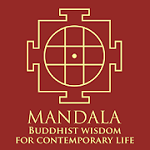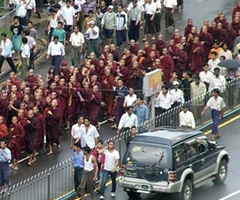
|
|
|
Home Asia Pacific South East Asia Myanmar Myanmar Protest News Where are Myanmar's monks?by GEOFFREY YORK, The Globe and Mail, October 2, 2007
Thousands of Buddhists have been arrested and scores killed, observers say, but no one can find them BANGKOK, Thailand -- After paying a heavy price for their uprising, Myanmar's monks are nursing their wounds and hoping for international action against the military junta that crushed their peaceful protests with bullets and tear gas.
Those numbers were issued by the Democratic Voice of Burma, a dissident news group based in Norway with close ties to pro-democracy activists. Another report said many of the arrested monks are being held at a former race course, where they were forced to give up their robes and change into civilian clothes.
Shari Villarosa, the top U.S. diplomat in Myanmar, told the Associated Press yesterday, "We do believe the death toll is higher than acknowledged by the government. We are doing our best to get more precise, more detailed information, not only in terms of deaths but also arrests." Ms. Villarosa said her staff had visited up to 15 monasteries around Rangoon and every single one was empty. She put the number of arrested demonstrators, monks and civilians in the thousands. "I know the monks are not in their monasteries," she said. "Where are they? How many are dead? How many are arrested?" She said the true death toll may never be known in a Buddhist country where bodies are cremated. "We're not going to find graves like they did in Yugoslavia. ... We have seen few dead bodies. The bodies are removed promptly. We don't know where they are being taken." The BBC reported yesterday that thousands of monks detained in Rangoon will be sent to prisons in the far north of the country. There are also reports that the monks are refusing to take food from the soldiers guarding them. "We're hearing stories every night of raids, but by the morning it's hard to confirm," a Western envoy told Agence France-Presse. "There are fewer and fewer monks to speak to. What have they done to so rapidly silence the monks? That's the big question that needs to be answered." Monks fleeing Burma for Thailand were interviewed yesterday by the BBC. "I was not involved, but they are arresting hundreds of monks," one said. "They are indiscriminate arrests. I had to flee." Monks in northern Burma who spoke to the Associated Press confirmed that many of their colleagues were killed or beaten and taken away by the military. But they predicted the monks would not give up. "I want our demands to be fulfilled. I want peace," said one. "The best thing is to have balance and equality and peace." The monks' strategy seems to be based on a faith that the world will take action against the regime that showed its brutality in the crackdown last week. But early signs suggest that the junta will escape any serious consequences from key neighbouring states. Myanmar's top generals appear confident that they can dodge the international pressure. Yesterday they snubbed a United Nations envoy, forcing him to cool his heels for a third consecutive day as he waited for a meeting with regime leader Senior General Than Shwe. The envoy, Ibrahim Gambari, arrived in Myanmar on Saturday to express the UN's outrage at the violent military crackdown that killed at least 10 people and perhaps many more. Yesterday he made his second trip to the country's remote new capital, Naypyidaw, in a failed effort to obtain a meeting with Gen. Shwe. The government, bizarrely, took the envoy instead to another remote town to attend a workshop on relations between Asia and the European Union. The envoy was finally promised a meeting today with the junta leader. But the delays suggest that the regime is quite willing to defy the international community. At the United Nations in New York, Myanmar's Foreign Minister accused "political opportunists" yesterday of trying to create a showdown in his country with foreign help so that they could exploit the ensuing chaos. In a speech to the United Nations General Assembly, U Nyan Win urged the international community to refrain from measures he said would add fuel to the fire. The regime's survival has depended largely on support from neighbouring countries such as Thailand, China and India. While these states have expressed concern about the bloodshed last week, none has taken any substantial steps to put pressure on the junta. India's new army chief, General Deepak Kapoor, said yesterday the crackdown in Myanmar was an "internal matter." He said India has a "good relationship" with the military junta. "I am sure that we will try to maintain that," he told reporters in New Delhi. Amnesty International said yesterday China and India are the main suppliers of weapons to the Myanmar regime. Russia, Serbia, Ukraine and a number of Southeast Asian nations are also providing arms to Myanmar, the group said. The monks, meanwhile, have abandoned their attempts at confronting the soldiers directly, at least for now. "The situation is very bleak," said Aung Zaw, an exile from Myanmar who is editor of Irrawaddy, a Thailand-based magazine on Myanmar issues. "The protests can't be sustained because of the violent crackdown. The people have told us that they are completely under military control. They're just trying to survive now. They can't even move around the city to take photos. It's a total blackout." In the months to come, the military will maintain a nightly curfew and will patrol the streets to break up even the smallest gatherings of protesters, he predicted. "There could be small pockets of resistance, hit-and-run groups, shouting slogans and disappearing." The monks are hoping their defiance of the military regime will spark a broader international movement to topple the junta, he said. "They've unmasked the true colours of the junta and shown its bad side, and now it's up to the international community to do something." But with the protesters gone from the streets yesterday, the soldiers showed their confidence by reopening the major Buddhist shrines and removing the barbed-wire barricades that had prevented the monks from reaching the shrines, the rallying points for the protests last week in Rangoon, the biggest city in the country. Thousands of soldiers were still deployed in the streets of Rangoon yesterday, preventing any hint of protest. They were stopping cars to search for cameras and video equipment, seeking to prevent any further documentation of the crackdown. |
 Get your Korean Buddhist News here, brought to you by BTN-Buddhist Channel |
 |
 The Mandala app brings together Buddhist wisdom and meditation techniques with the latest insights of psychology and neuroscience to handle the challenges and complexities of modern life. The App offers a series of engaging talks and conversations with experts on a wide variety of topics, such as managing stress, dealing with adversity, developing greater resilience, cultivating empathy and compassion, creating healthy relationships, and many more. These topics are explored to help find greater peace, meaning and joy in our lives. Our panel of experts include Dr, Thupten Jinpa, Daniel Goleman, Kelly McGonigal and others.FREE DOWNLOAD here |
| Point
your feed reader to this location |
| Submit an Article |
| Write to the Editor |

 A new estimate by a well-connected dissident group has concluded that 138 people were killed and about 6,000 detained, including about 2,400 Buddhist monks, when the regime smashed the anti-government protests last week.
A new estimate by a well-connected dissident group has concluded that 138 people were killed and about 6,000 detained, including about 2,400 Buddhist monks, when the regime smashed the anti-government protests last week.